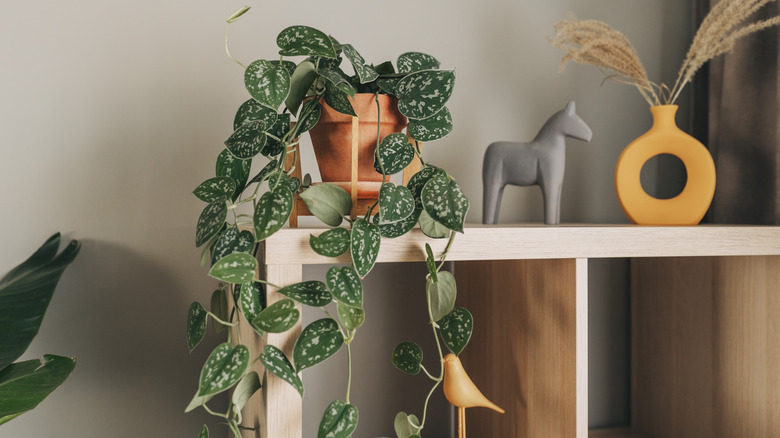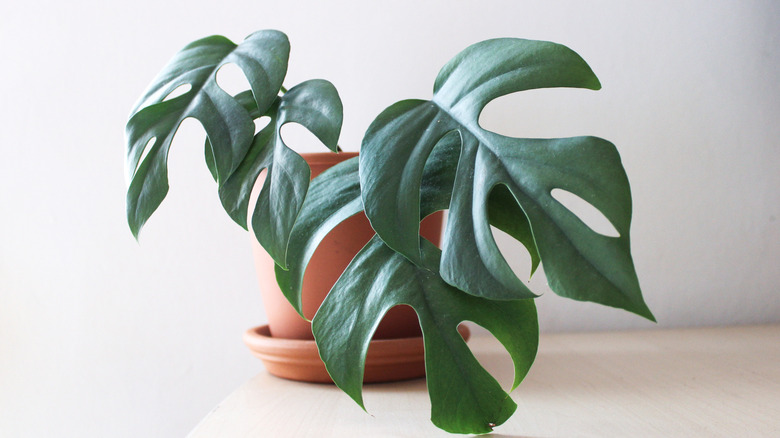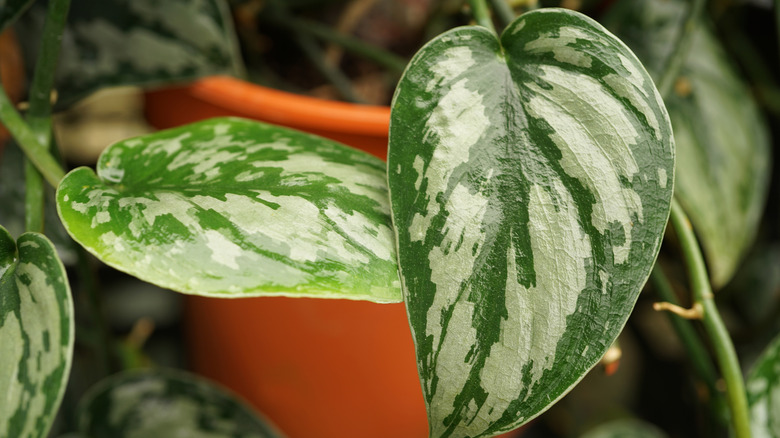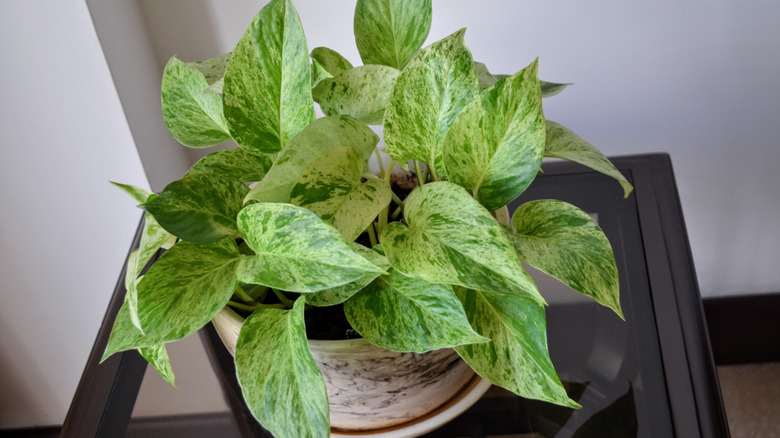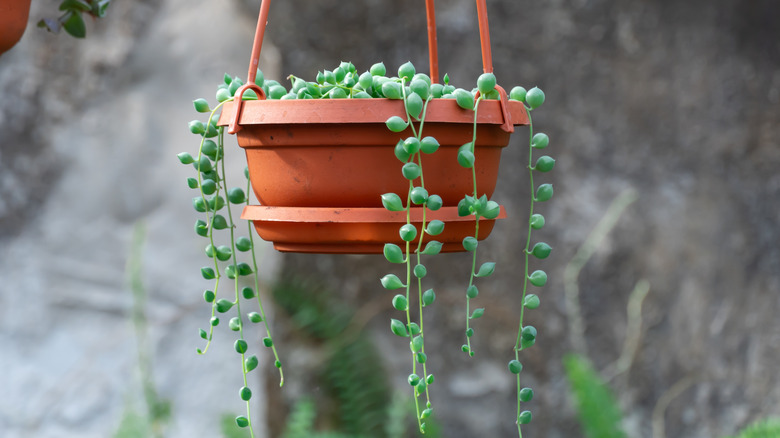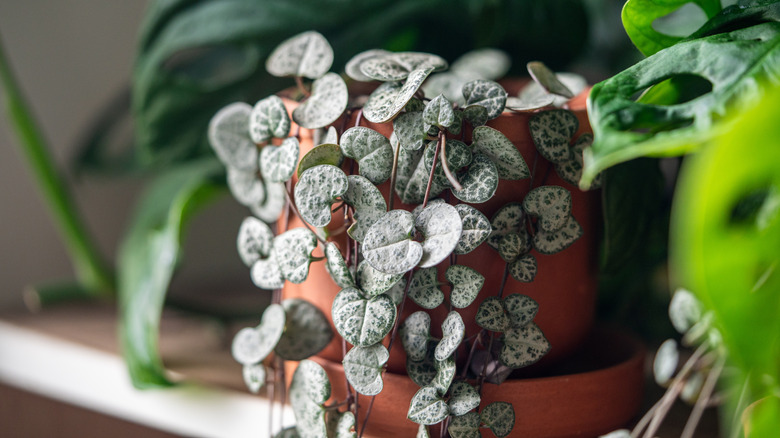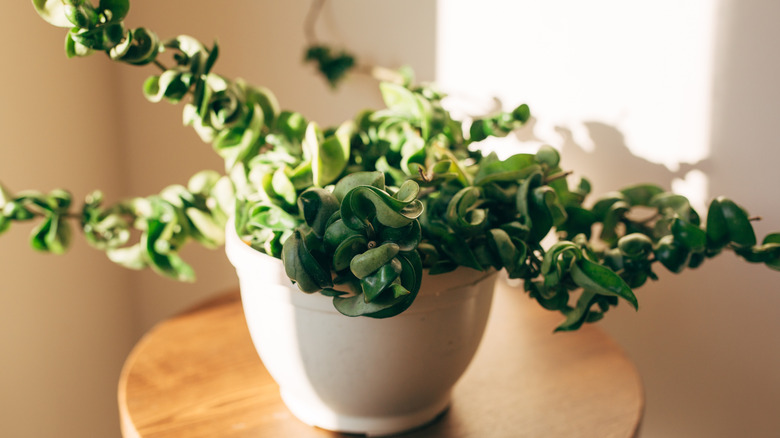Vining Houseplants That Won't Take Over Your Home
We may receive a commission on purchases made from links.
Houseplants have many benefits. They add a punch of color to any decor, some smell nice, and they can remove toxins from the air, making your home a healthier place. There's even research that suggests indoor plants can lift your mood, enhance concentration, and boost productivity. You can grow lush, tropical houseplants year-round, while outside your window are brown, dying plants and snow-covered ground.
Vining plants are a great addition to your indoor plant arsenal you may have overlooked. They aren't just for covering walls or climbing gazebos. There are vining plants that are easily contained, such as stringing succulents and smaller varieties of monstera and hoyas. These houseplants add greenery to your home without pushing it to "Grey Gardens" levels.
There are two varieties of vining plants: climbing and trailing, the difference being that one grows up and one grows down. Climbing plants can grow up a decorative trellis, or in a pot with structural support. Trailing houseplants look great in hanging baskets, on a mantel, or cascading down a bookshelf. Both varieties offer a range of species that thrive in various conditions and for various degrees of owner — whether you have a green thumb or you're a plant-growing novice.
Mini monstera (Raphidophora tetrasperma)
There are many types of monstera plants, and all make excellent houseplants. Mini monstera (Raphidophora tetrasperma) — also known as dwarf monstera — is a smaller version of Monstera deliciosa. It is found in Thailand and Malaysia, and brings a tropical feel to any home. These plants grow tall in pots with added support, such as a trellis or a GardenGear moss pole. The mini monstera prefers indirect sunlight and should be watered only when the top layer of potting mix is dry. If ingested, they are toxic to humans and pets.
Argyraeus (Scindapsus pictus)
The argyraeus (Scindapsus pictus) has vines that grow to a manageable 5 feet and won't require constant pruning. Its beautiful satin leaves are covered in silvery spots adding visual interest, and its vines look great cascading from a DIY hanging planter or an earth-bound pot. Water when the soil is dry, and keep it in a location with bright, indirect sunlight. Argyraeus is toxic to pets.
Pothos (Epipremnum aureum)
Pothos (Epipremnum aureum) is a popular climbing houseplant that grows quickly and easily. With vines growing up to 12 feet, it will need regular pruning. It requires low or indirect sunlight and watering only when the soil is dry. It works as both a hanging plant or climbing a bamboo trellis. Pothos is toxic to pets, however. There are a few pathos varietals such as 'Golden' (golden, yellow-green leaves), 'Neon' (all-yellow leaves), 'Lime' (bright yellow-green), 'Jade' (dark green), and 'Marble Queen' (streaked with white).
String of Pearls (Senecio rowleyanus)
String of pearls (Senecio rowleyanus) can go weeks without water. But they are actually hard to keep alive, since the pearls will shrivel when overwatered and underwatered, making problems hard to diagnose. They also require lots of bright, direct sunlight, so choosing where to place them in your home is key. This succulent is small and compact, with strings reaching around 2 feet in length. It's the perfect houseplant for those who want a hint of green without a large mass of vines to maintain. String of pearls can be toxic to people and animals.
String of hearts (Ceropegia woodii)
Both string of hearts (Ceropegia woodii) and string of pearls are succulents of the "string" variety, but that is where the similarities end. String of hearts can grow to 12 feet in a tangled mess, so regular pruning is required (but due to its small, compact size, it won't turn your home into a jungle). This succulent should only be watered if the soil is dry, and prefers indirect sunlight. It works well on a topiary frame or hanging basket, and is thankfully nontoxic to both people and pets.
Hoya compacta (Hoya carnosa compacta)
As the name suggests, the Hoya compacta (Hoya carnosa 'Compacta') is a compact, slower-growing version of the popular Hoya carnosa, and is commonly referred to as Hindu rope. Hoya compacta is great for pet owners, being nontoxic to animals and children. It has unique, tightly curled wax leaves and will produce fragrant pink or white flowers after a few years of growth. Keep in a well-drained pot out of direct light and water when the soil is dry and reduce watering during winter months.
